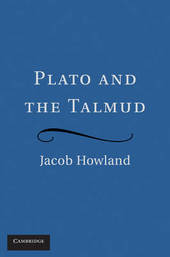
|
Plato and the Talmud
Hardback
Main Details
| Title |
Plato and the Talmud
|
| Authors and Contributors |
By (author) Jacob Howland
|
| Physical Properties |
| Format:Hardback | | Pages:294 | | Dimensions(mm): Height 235,Width 160 |
|
| Category/Genre | Western philosophy - Ancient to c 500
Judaism |
|---|
| ISBN/Barcode |
9780521193139
|
| Classifications | Dewey:184 |
|---|
| Audience | | Professional & Vocational | |
|---|
|
Publishing Details |
| Publisher |
Cambridge University Press
|
| Imprint |
Cambridge University Press
|
| Publication Date |
11 October 2010 |
| Publication Country |
United Kingdom
|
Description
This innovative study sees the relationship between Athens and Jerusalem through the lens of the Platonic dialogues and the Talmud. Howland argues that these texts are animated by comparable conceptions of the proper roles of inquiry and reasoned debate in religious life, and by a profound awareness of the limits of our understanding of things divine. Insightful readings of Plato's Apology, Euthyphro and chapter three of tractate Ta'anit explore the relationship of prophets and philosophers, fathers and sons, and gods and men (among other themes), bringing to light the tension between rational inquiry and faith that is essential to the speeches and deeds of both Socrates and the Talmudic sages. In reflecting on the pedagogy of these texts, Howland shows in detail how Talmudic aggadah and Platonic drama and narrative speak to different sorts of readers in seeking mimetically to convey the living ethos of rabbinic Judaism and Socratic philosophising.
Author Biography
Jacob Howland is McFarlin Professor of Philosophy at the University of Tulsa. He is the author of Kierkegaard and Socrates: A Study in Philosophy and Faith (Cambridge University Press, 2006), The Paradox of Political Philosophy: Socrates' Philosophic Trial (1998) and The Republic: The Odyssey of Philosophy (1993). He also edited A Long Way Home: The Story of a Jewish Youth, 1939-1948, by Bob Golan (2005) and has published numerous articles.
Reviews'Jacob Howland's Plato and the Talmud is a splendid addition to the small - but growing and distinguished - body of work in the secular academy, which takes as its fundamental principle that teaching and scholarship in the humanities must include a basic knowledge of the great Rabbinic corpus of the first millennium of the Common Era. And here Howland shows with remarkable clarity that the Rabbinic material has a tight conceptual relationship to one of the other formative traditions of western culture, namely Greek philosophy of the Platonic school. This is a remarkable book, wide in its knowledge, graceful in its presentation, modest in its posture: exactly what real scholarship should be.' Donald Harman Akenson, author of Surpassing Wonder: The Invention of the Bible and the Talmuds
|